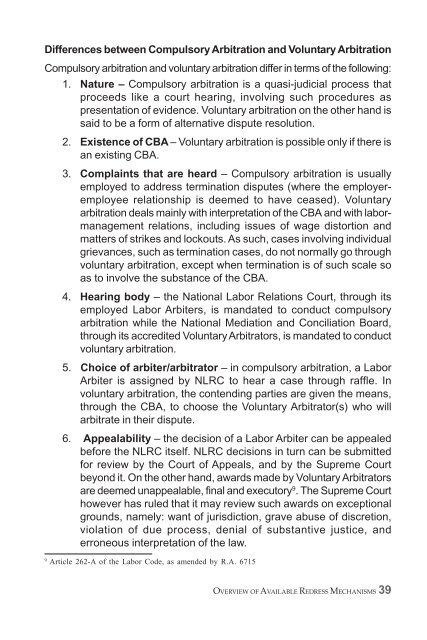Download this publication - AIDS Data Hub
Download this publication - AIDS Data Hub
Download this publication - AIDS Data Hub
- No tags were found...
Create successful ePaper yourself
Turn your PDF publications into a flip-book with our unique Google optimized e-Paper software.
Differences between Compulsory Arbitration and Voluntary ArbitrationCompulsory arbitration and voluntary arbitration differ in terms of the following:1. Nature – Compulsory arbitration is a quasi-judicial process thatproceeds like a court hearing, involving such procedures aspresentation of evidence. Voluntary arbitration on the other hand issaid to be a form of alternative dispute resolution.2. Existence of CBA – Voluntary arbitration is possible only if there isan existing CBA.3. Complaints that are heard – Compulsory arbitration is usuallyemployed to address termination disputes (where the employeremployeerelationship is deemed to have ceased). Voluntaryarbitration deals mainly with interpretation of the CBA and with labormanagementrelations, including issues of wage distortion andmatters of strikes and lockouts. As such, cases involving individualgrievances, such as termination cases, do not normally go throughvoluntary arbitration, except when termination is of such scale soas to involve the substance of the CBA.4. Hearing body – the National Labor Relations Court, through itsemployed Labor Arbiters, is mandated to conduct compulsoryarbitration while the National Mediation and Conciliation Board,through its accredited Voluntary Arbitrators, is mandated to conductvoluntary arbitration.5. Choice of arbiter/arbitrator – in compulsory arbitration, a LaborArbiter is assigned by NLRC to hear a case through raffle. Involuntary arbitration, the contending parties are given the means,through the CBA, to choose the Voluntary Arbitrator(s) who willarbitrate in their dispute.6. Appealability – the decision of a Labor Arbiter can be appealedbefore the NLRC itself. NLRC decisions in turn can be submittedfor review by the Court of Appeals, and by the Supreme Courtbeyond it. On the other hand, awards made by Voluntary Arbitratorsare deemed unappealable, final and executory 9 . The Supreme Courthowever has ruled that it may review such awards on exceptionalgrounds, namely: want of jurisdiction, grave abuse of discretion,violation of due process, denial of substantive justice, anderroneous interpretation of the law.9Article 262-A of the Labor Code, as amended by R.A. 6715OVERVIEW OF AVAILABLE REDRESS INTRODUCTION MECHANISMS 39















